Ora 00933 Sql Command Not Properly Ended
The SQL command not properly ended error, also known as ORA-00933, is a common error that occurs when executing SQL statements. This error indicates that there is a syntax issue in the SQL command, and the command cannot be properly executed by the database.
Common causes of the ORA-00933 error
There are several common causes that can trigger the ORA-00933 error. Understanding these causes can help in effectively resolving the issue. Some of the common causes include:
1. Missing or misplaced punctuation: The SQL command may have missing or misplaced punctuation marks, such as commas or semicolons. This can affect the syntax of the command and result in the ORA-00933 error.
2. Incomplete queries or subqueries: If the SQL command or subquery is incomplete, the database will not be able to interpret it correctly, leading to the ORA-00933 error.
3. Complex SQL statements: Complex SQL statements involving multiple clauses, joins, or subqueries can be prone to syntax issues. The ORA-00933 error may occur if there are syntax errors in these statements.
Analyzing syntax issues leading to the error
To resolve the ORA-00933 error, it is crucial to analyze the syntax issues causing the error. This involves carefully examining the SQL command for any missing or misplaced punctuation marks, incomplete queries, or syntax errors.
One useful technique is to break down the SQL command into smaller parts and execute them individually. By doing this, you can pinpoint the specific part of the command that is causing the error.
For example, if you have a complex SQL statement with multiple joins, you can comment out some parts and execute the remaining parts to identify the problematic section. This step-by-step approach can help in isolating the syntax issue and resolving the ORA-00933 error.
Resolving ORA-00933 error caused by missing or misplaced punctuation
One of the primary causes of the ORA-00933 error is missing or misplaced punctuation marks. To resolve this issue, carefully review the SQL command and check if all the necessary punctuation marks are present in the correct positions.
For example, if you are using multiple columns in the SELECT statement, ensure that each column is separated by a comma. Similarly, if the SQL command includes subqueries, ensure that the parenthesis are properly placed.
By correcting the punctuation issues, you can rectify the syntax problem and eliminate the ORA-00933 error.
Handling ORA-00933 error related to incomplete queries or subqueries
Incomplete queries or subqueries can also result in the ORA-00933 error. To resolve this issue, carefully review the SQL command and check if all the necessary components are present.
For example, if you are using the WHERE clause, ensure that the condition is complete and all necessary operands are included. Similarly, if the SQL command includes subqueries, ensure that they are written correctly and provide the necessary information.
By completing and correcting any incomplete queries or subqueries, you can eliminate the ORA-00933 error.
Dealing with ORA-00933 error in complex SQL statements
Complex SQL statements involving multiple clauses, joins, or subqueries can be challenging to debug and resolve. In such cases, it is necessary to carefully analyze each part of the SQL command to identify any syntax errors or missing components.
Using debugging techniques, such as executing smaller parts of the SQL command, can help in identifying the problematic section. Additionally, utilizing testing tools or IDEs that provide SQL syntax highlighting and error detection can also be beneficial.
By thoroughly analyzing and correcting any syntax errors in the complex SQL statements, you can eliminate the ORA-00933 error and ensure the successful execution of the command.
FAQs
Q: What is the ORA-00933 error?
A: The ORA-00933 error, also known as “SQL command not properly ended,” is an error that occurs when there is a syntax issue in an SQL command.
Q: How can I resolve the ORA-00933 error?
A: To resolve the ORA-00933 error, carefully review the SQL command for any missing or misplaced punctuation marks, incomplete queries or subqueries, and syntax issues. Correcting these problems will help eliminate the error.
Q: Can missing or misplaced punctuation cause the ORA-00933 error?
A: Yes, missing or misplaced punctuation marks in the SQL command can cause the ORA-00933 error. Therefore, it is essential to ensure that all necessary punctuation marks are present in the correct positions.
Q: What should I do if I encounter the ORA-00933 error in a complex SQL statement?
A: When dealing with a complex SQL statement, break it down into smaller parts and execute them individually. This step-by-step approach will help in identifying the specific section of the command causing the error.
Q: Are there any debugging techniques that can help resolve the ORA-00933 error?
A: Yes, you can use various debugging techniques, such as executing smaller parts of the SQL command and using SQL syntax highlighting tools or IDEs that detect syntax errors. These techniques can assist in analyzing and resolving the ORA-00933 error.
Databases: Ora-00933: Sql Command Not Properly Ended
What Is Ora 00923 Sql Command Not Properly Ended?
Introduction:
When working with Oracle databases, it is common to encounter various error messages that can hinder the successful execution of SQL commands. One such error, “ORA-00923: SQL command not properly ended,” often puzzles database administrators and developers alike. In this article, we will delve into the details of this error, explore its potential causes, and provide potential solutions.
## Table of Contents:
1. Understanding the “ORA-00923” Error
2. Common Causes of the “ORA-00923” Error
3. Resolving the “ORA-00923” Error
a. Checking Syntax Errors
b. Using Valid SQL Constructs
c. Paying Attention to DML Statements
d. Resolving Subquery Issues
4. FAQs
5. Conclusion
## Understanding the “ORA-00923” Error:
The “ORA-00923: SQL command not properly ended” error is a commonly encountered error in Oracle databases. It signifies that the SQL command in question has syntactical issues or lacks the required components to execute successfully. This error can occur in a variety of scenarios, including but not limited to querying, updating, or deleting database records.
## Common Causes of the “ORA-00923” Error:
1. Syntax Errors:
– Missing or misplaced punctuation marks such as commas, brackets, or quotes.
– Incorrectly placed operators within conditional statements.
– Incorrect usage of clauses or keywords.
2. Invalid SQL Constructs:
– Using unsupported or deprecated SQL constructs.
– Misusing SQL functions or operators.
3. DML Statement Issues:
– Inappropriately used clauses such as WHERE, GROUP BY, or HAVING.
– Misaligned parentheses or incorrect nesting of subqueries.
4. Subquery Problems:
– Incomplete or improperly structured subqueries.
– Incorrect or mismatched aliases within subqueries.
## Resolving the “ORA-00923” Error:
a. Checking Syntax Errors:
– Carefully review the query for any missing or misplaced punctuation marks.
– Ensure the correct usage of operators, clauses, and keywords.
– Consider utilizing an SQL query formatting tool for improved readability and identifying potential syntax issues.
b. Using Valid SQL Constructs:
– Verify the SQL constructs used within the statement are supported and appropriate for the respective Oracle version.
– Consult Oracle documentation or relevant resources to confirm the correct usage of SQL functions and operators.
c. Paying Attention to DML Statements:
– Double-check the syntax and placement of DML clauses such as WHERE, GROUP BY, or HAVING.
– Ensure the parentheses are properly aligned and subqueries are adequately nested.
d. Resolving Subquery Issues:
– Review the subquery construct and confirm it is complete and correctly structured.
– Verify that the aliases and column references within the subquery align with their intended usage.
– Consider isolating and troubleshooting the subquery separately to identify potential issues.
## FAQs:
Q1: Can this error occur due to a missing semi-colon at the end of a SQL statement?
A1: No, the lack of a semi-colon typically results in a different error (“ORA-00933: SQL command not properly ended”). The “ORA-00923” error generally involves syntactical issues within the SQL statement itself.
Q2: Are there any specific tools or utilities available to assist in identifying syntax errors?
A2: Yes, you can use various integrated development environments (IDEs) or SQL editors that provide syntax highlighting and real-time error identification. Additionally, Oracle SQL Developer is a popular tool offering such features.
Q3: How can I ensure the correct usage of Oracle-specific SQL operators and functions?
A3: Consult Oracle documentation or related resources, such as the Oracle SQL Reference Guide or official Oracle forums, to find accurate information about valid SQL constructs and their intended usage.
## Conclusion:
The “ORA-00923: SQL command not properly ended” error can be frustrating, but understanding its causes is crucial for effective resolution. By thoroughly reviewing SQL statements, checking for syntax errors, using valid SQL constructs, paying attention to DML statements, and ensuring the integrity of subqueries, one can efficiently address and eliminate this error from your Oracle database. Remember to consult the relevant documentation and resources available to resolve specific questions or concerns.
How To End Sql Command In Oracle?
Structured Query Language (SQL) is a powerful tool used to communicate with and manipulate databases. When working with SQL commands in Oracle, it is crucial to know how to properly end a command to ensure accuracy and efficiency. In this article, we will explore different ways to end an SQL command in Oracle and provide detailed explanations to help you understand each method. Let’s dive in!
1. Use a Semicolon (;)
The most common way to end an SQL command in Oracle is by including a semicolon at the end of the command. The semicolon acts as a terminator, indicating the completion of the command. For example, to select all data from a table named “employees,” you would write the following command:
SELECT * FROM employees;
2. Use a Slash (/)
In Oracle, you can also use a slash (/) to end and execute an SQL command. The slash signifies the termination of the statement, and pressing Enter immediately after the slash executes the command. This method is particularly useful when working with SQL*Plus, Oracle’s command-line interface. For instance, to insert data into a table named “customers,” you can type the following:
INSERT INTO customers (id, name) VALUES (1, ‘John Smith’);
/
3. Utilize a SQL Client
If you are using a graphical user interface (GUI) SQL client, such as SQL Developer or Toad, ending a command is often not required. These tools automatically handle the termination of SQL statements, eliminating the need to explicitly indicate the end of a command. However, it’s still good practice to include a semicolon to ensure consistency and improve readability.
Frequently Asked Questions (FAQs):
Q1. What happens if I forget to end an SQL command in Oracle?
If you forget to end an SQL command in Oracle, you will encounter a syntax error. The database will interpret the subsequent statements as part of the same command, resulting in unexpected results or even failure to execute the query.
Q2. Can I use comments in an SQL command in Oracle?
Yes, you can use comments to add explanatory notes within your SQL commands. To comment a single line, start it with two hyphens (–), and anything after the hyphens will be ignored by the database. To comment multiple lines, enclose them between /* and */. Comments do not affect the execution of the command and serve as helpful annotations for yourself and other developers.
Q3. Should I always use a semicolon to end an SQL command in Oracle?
Using a semicolon to end an SQL command is a good practice that helps ensure the completeness and readability of your code. While it is not always mandatory, especially when utilizing a SQL client, incorporating semicolons consistently throughout your codebase is highly recommended.
Q4. Can I include multiple SQL commands in a single statement?
Yes, you can include multiple SQL commands in a single statement by separating them with semicolons. This technique is often referred to as a “batch” or “script.” However, be cautious when executing batches as each command will be executed sequentially, and any errors encountered might impact the subsequent statements.
Q5. Are there any alternatives to ending an SQL command in Oracle?
In addition to the methods mentioned above, you can also use the SQL*Plus command “EXIT” or “QUIT” to terminate a session, which ultimately results in ending any pending SQL commands. However, it’s worth noting that this is not a recommended practice for terminating individual commands within an SQL script or session.
In conclusion, properly ending an SQL command in Oracle is crucial to ensure accurate execution and avoid syntax errors. We covered three common ways to end commands, which are using a semicolon, a slash, or relying on a SQL client. It’s good practice to consistently include a semicolon in your commands to maintain code readability. Additionally, the usage of comments can help improve code documentation. Understanding the importance of properly terminating SQL commands will contribute to a seamless and efficient database management experience.
Keywords searched by users: ora 00933 sql command not properly ended Java SQL SQLSyntaxErrorException ORA-00933: SQL command not properly ended, SQL command not properly ended SELECT, SQL command not properly ended Oracle, cx_Oracle databaseerror ORA-00933: SQL command not properly ended, Sql command not properly ended là gì, SQL command not properly ended limit, Sql command not properly ended order BY, ORA-01861: literal does not match format string
Categories: Top 54 Ora 00933 Sql Command Not Properly Ended
See more here: nhanvietluanvan.com
Java Sql Sqlsyntaxerrorexception Ora-00933: Sql Command Not Properly Ended
In the world of database management systems, SQL (Structured Query Language) plays a crucial role as it allows users to communicate with relational databases effectively. Java, being one of the most popular programming languages, has extensive support for interacting with databases using SQL. However, at times, developers encounter SQLSyntaxErrorException ORA-00933, which indicates that the SQL command they have executed is not properly ended. In this article, we will delve into the details of this error, its possible causes, and how to resolve it.
Understanding SQLSyntaxErrorException ORA-00933
The ORA-00933 error is specific to Oracle databases and is thrown when the SQL statement has a syntax error, thus causing the SQL command to not be properly ended. It can occur while executing any SQL statement, such as SELECT, UPDATE, INSERT, DELETE, or even DDL (Data Definition Language) statements like CREATE TABLE or ALTER TABLE.
Possible Causes of SQLSyntaxErrorException ORA-00933
1. Missing or misplaced semicolon (;): In Oracle SQL, each SQL statement must end with a semicolon. Forgetting to add a semicolon or placing it incorrectly can lead to the ORA-00933 error.
2. Improper use of SQL keywords: The ORA-00933 error can occur when SQL keywords like SELECT, FROM, WHERE, or JOIN are used incorrectly in the SQL statement.
3. Invalid or misspelled column name: If the SQL statement references a non-existent or misspelled column name, the ORA-00933 error may be thrown.
4. Missing parentheses or quotation marks: Incorrect usage or improper nesting of parentheses or quotation marks can result in the ORA-00933 error.
5. Syntax errors in subqueries: If the SQL statement contains subqueries, any syntax errors within these subqueries can also cause the ORA-00933 error.
Resolving SQLSyntaxErrorException ORA-00933
1. Check for missing semicolons: Ensure that each SQL statement is properly terminated with a semicolon.
2. Verify the correct usage of keywords: Review the SQL statement, paying close attention to the correct placement and usage of keywords. Cross-check with SQL syntax guidelines or official documentation.
3. Examine column names: Double-check column names referenced in the SQL statement. Ensure they exist and are spelled correctly.
4. Validate parentheses and quotation marks: Make sure parentheses and quotation marks are correctly used and balanced, especially if they are nested or used within the SQL statement.
5. Debug subqueries separately: If the SQL statement contains subqueries, consider debugging them independently by evaluating their syntax and logic individually. Once the subqueries are error-free, incorporate them back into the main SQL statement.
FAQs
Q: Why am I getting ORA-00933: SQL command not properly ended error?
A: This error indicates that the SQL statement being executed has a syntax error, such as missing semicolons, improper keyword usage, invalid column names, or issues with parentheses/quotation marks.
Q: How do I fix the ORA-00933 error?
A: To resolve the error, ensure that each SQL statement ends with a semicolon, verify the correct usage of keywords, validate column names, and ensure proper usage of parentheses/quotation marks. If subqueries are involved, debug them separately before incorporating them into the main SQL statement.
Q: Can ORA-00933 error occur in languages other than Java?
A: Yes, the ORA-00933 error is specific to Oracle databases and can occur in any programming language that interacts with an Oracle database using SQL. So, it can be encountered in Java, as well as other languages like Python, C#, etc.
Q: Are there any tools that can help identify the cause of the ORA-00933 error?
A: Yes, various IDEs (Integrated Development Environments) offer SQL syntax highlighting, linting, and autocompletion features that can help identify syntax errors in real-time. Additionally, database management tools like Oracle SQL Developer or Toad for Oracle provide comprehensive error messages and suggestions to resolve the syntax errors.
Q: Can an ORA-00933 error be avoided altogether?
A: While it’s challenging to completely avoid syntax errors, following coding best practices (such as proper indentation, code reviews, and thorough testing) can significantly reduce the occurrence of ORA-00933 errors.
In conclusion, the ORA-00933 error, specifically Java SQL SQLSyntaxErrorException ORA-00933: SQL command not properly ended, is a common issue encountered by developers working with Oracle databases and SQL statements in Java. Understanding the possible causes and following the suggested resolutions discussed in this article can assist in resolving this error effectively. Remember to thoroughly review SQL syntax rules, pay close attention to details, and debug subqueries separately if necessary.
Sql Command Not Properly Ended Select
Understanding the Error:
When executing a SELECT statement in SQL, the “SQL command not properly ended” error typically occurs due to one or more syntax errors in the query. A syntax error implies that the way the query is structured violates the rules of SQL syntax. These errors can take different forms, such as missing or misspelled keywords, incorrect placement of clauses, or lacking necessary punctuation marks.
Causes and Solutions:
1. Misplaced or Missing Punctuation: SQL statements rely on various punctuation marks to separate different parts of the query. For instance, the SELECT statement requires a comma (,) to separate multiple columns being selected. Omitting or misplacing these punctuation marks can trigger the “SQL command not properly ended” error. To resolve this, ensure that you place commas in the correct locations and use them whenever required.
2. Incorrect Clauses: SQL statements consist of various clauses, such as SELECT, FROM, WHERE, GROUP BY, and ORDER BY, among others. Improper usage or incorrect placement of these clauses can lead to syntax errors. To fix this issue, cross-check that you are using the clauses at the correct positions and following the correct order defined in SQL syntax rules.
3. Typographical Errors: Misspelled keywords or table/column names can also cause the “SQL command not properly ended” error. It is vital to double-check the spelling of all identifiers used in the query, ensuring they match the corresponding schema definitions. Using an Integrated Development Environment (IDE) or text editor with autocomplete features can minimize typos and assist in identifying potential mistakes.
4. Incorrect Use of Single Quotes: SQL uses single quotes (”) to delimit string literals. However, using single quotes within the query without escaping them appropriately can result in a syntax error. To mitigate this, either escape the single quote characters by doubling them (”) or use an alternative method, such as concatenating strings using the CONCAT function.
5. Invalid Column Aliases: When retrieving data from tables, it is common to assign temporary names to the retrieved columns using aliases. These aliases must adhere to SQL naming conventions and should not conflict with any keywords. If an invalid alias is used, the “SQL command not properly ended” error can occur. Correcting this error involves ensuring that aliases are valid, unique, and do not clash with reserved keywords.
FAQs:
Q: Why am I getting the “SQL command not properly ended” error?
A: This error occurs due to syntax errors in your SQL query. Check for misplaced or missing punctuation, incorrect clause usage, typographical errors, incorrect use of single quotes, or invalid column aliases.
Q: How can I find the exact location of the error in a large SQL query?
A: Many IDEs and database management systems provide error handling mechanisms that highlight the problematic section of the query. Additionally, executing the SQL query in smaller chunks can help pinpoint the location of the error.
Q: Can the “SQL command not properly ended” error occur with commands other than SELECT?
A: While this error is most commonly associated with SELECT statements, it can occur with other SQL commands like INSERT, UPDATE, DELETE if there are syntax errors in those queries as well.
Q: Is it possible to have nested queries or subqueries with this error?
A: Yes, it is possible to encounter the “SQL command not properly ended” error within nested queries or subqueries. Ensuring the correct syntax for each level of nesting is crucial.
Q: Are there any SQL debugging tools available to help identify and resolve these errors?
A: Many IDEs and database management systems come equipped with built-in debugging tools that help identify and troubleshoot SQL syntax errors. Leveraging these tools can simplify the process of resolving the “SQL command not properly ended” error.
Conclusion:
The “SQL command not properly ended” error is a common obstacle faced by developers when working with SQL queries, particularly SELECT statements. By thoroughly understanding the potential causes behind this error and implementing appropriate solutions, developers can minimize its occurrence. Taking the time to meticulously review and validate the syntax of the SQL queries before executing them can save significant debugging time and enhance productivity in database management tasks.
Sql Command Not Properly Ended Oracle
SQL is a powerful and versatile language used for managing and manipulating data in relational databases. Whether you are a beginner or an experienced developer, encountering errors while writing SQL queries is inevitable. One common error that Oracle database users often come across is the “SQL Command Not Properly Ended” error. This article aims to explain this error, explore its causes, and provide solutions to resolve it.
What is the “SQL Command Not Properly Ended” error in Oracle?
The “SQL Command Not Properly Ended” error is an Oracle database error message that occurs when there is a syntax issue in an SQL statement. It is usually encountered when executing a query that contains an incorrect placement of SQL keywords or a missing punctuation mark.
What causes the “SQL Command Not Properly Ended” error?
This error can arise due to various reasons. Some common causes include:
1. Missing or misplaced SQL keywords: SQL is a language with specific syntax rules. If a query does not adhere to these rules or if SQL keywords are not used correctly, the error may occur. For example, forgetting to include an essential keyword like “FROM” in a SELECT statement could trigger this error.
2. Unbalanced parentheses: Parentheses play a crucial role in SQL queries, especially when using complex conditions or subqueries. If parentheses are not properly balanced (i.e., an opening parenthesis without a closing parenthesis or vice versa), the error may occur.
3. Incorrect usage of single quotes: In SQL, single quotes are used to represent string literals. If the quotes are misplaced or omitted in a query, it can lead to the “SQL Command Not Properly Ended” error.
4. Incompatible SQL clauses: Certain SQL clauses cannot be used together, such as combining a WHERE clause with a GROUP BY clause that references a column not mentioned in the GROUP BY statement. These incompatible combinations can trigger the error.
5. Missing semicolon: Oracle SQL typically requires a semicolon (;) at the end of each statement. If the semicolon is missing, the error may occur.
How to resolve the “SQL Command Not Properly Ended” error?
Resolving this error requires careful examination of the SQL query and identifying the omissions or syntax issues. Here are a few steps to help troubleshoot and fix the error:
1. Review the query: Thoroughly review the entire SQL query to ensure that it follows the correct syntax and all necessary keywords are present. Pay attention to the spacing between words and punctuation marks, as even a minor typographical error can lead to the error message.
2. Verify parentheses: If your query involves complex conditions or subqueries, check whether the parentheses are properly balanced. Ensure that each opening parenthesis has a corresponding closing parenthesis.
3. Check single quotes usage: Examine all the string literals in your query to ensure that single quotes are used correctly. Each opening single quote should be matched with a closing single quote.
4. Analyze incompatible SQL clauses: If the error is caused by incompatible SQL clauses, review the Oracle documentation or consult a reliable source to understand the allowed combinations. Adjust your query accordingly to resolve the conflict.
5. Add missing semicolon: Ensure that a semicolon is placed at the end of each SQL statement. While not strictly required in every Oracle SQL environment, adding a semicolon is generally good practice and can help avoid potential errors.
FAQs about the “SQL Command Not Properly Ended” error:
Q1. How can I prevent encountering this error in the first place?
A: To minimize the chance of seeing this error, double-check your SQL statements for syntax correctness, ensure the proper placement of SQL keywords, use balanced parentheses, and consistently apply single quotes for string literals. Adhering to best practices and reviewing your queries before execution can help prevent this error.
Q2. Can this error occur with specific versions of Oracle database?
A: No, this error is not version-dependent. It can occur on any version of the Oracle database if the SQL syntax rules are not followed correctly.
Q3. Are there any tools available to assist in identifying syntax errors?
A: Yes, various Integrated Development Environments (IDEs), such as Oracle SQL Developer and PL/SQL Developer, include built-in features to highlight syntax errors as you write your queries. Additionally, there are online SQL syntax validators that can be used to verify the correctness of your SQL statements.
Q4. I have checked my query thoroughly, but the error still persists. What else can I do?
A: If you have reviewed your query multiple times and still cannot identify the cause of the error, consider seeking assistance from fellow developers or the Oracle community. Posting your query along with the encountered error message on relevant online forums or discussion boards can often yield helpful insights and suggestions.
In conclusion, encountering the “SQL Command Not Properly Ended” error in Oracle is a common occurrence, but it can be easily resolved. By thoroughly reviewing the query, checking the correct usage of SQL keywords, ensuring balanced parentheses, and employing best practices while writing SQL, developers can avoid this error and make their queries execute smoothly. Stay vigilant, double-check your work, and utilize available resources to receive timely assistance when needed.
Images related to the topic ora 00933 sql command not properly ended

Found 12 images related to ora 00933 sql command not properly ended theme
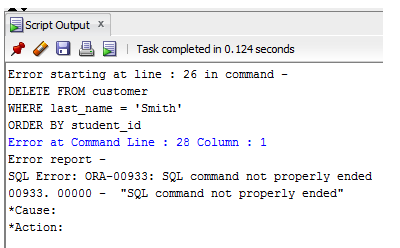




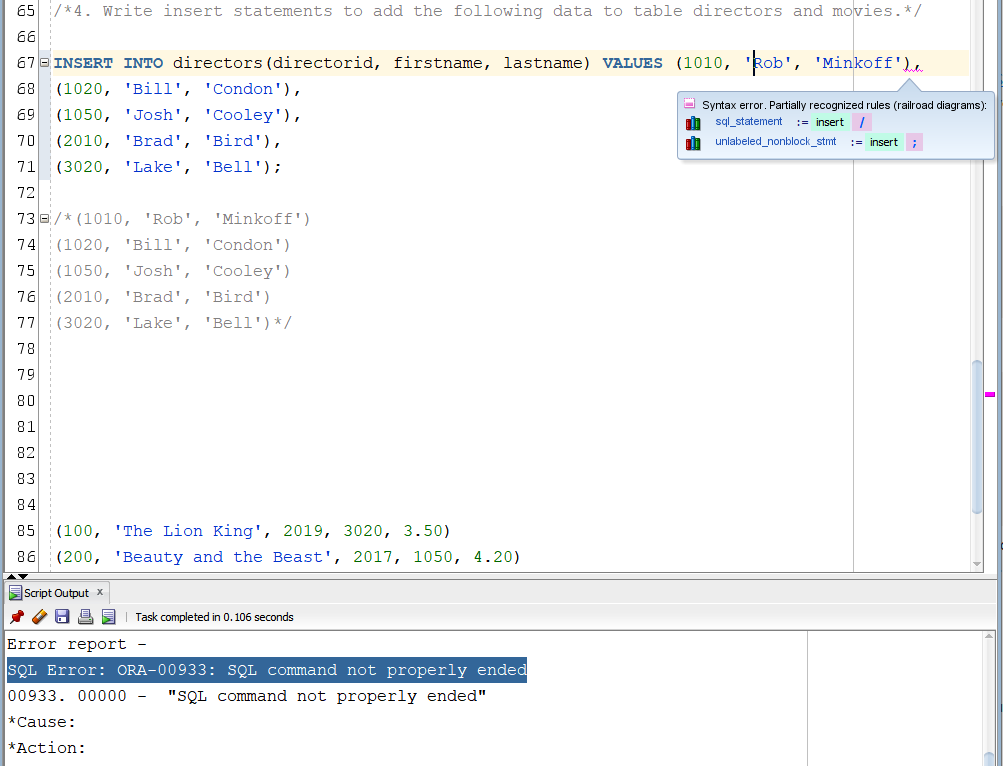







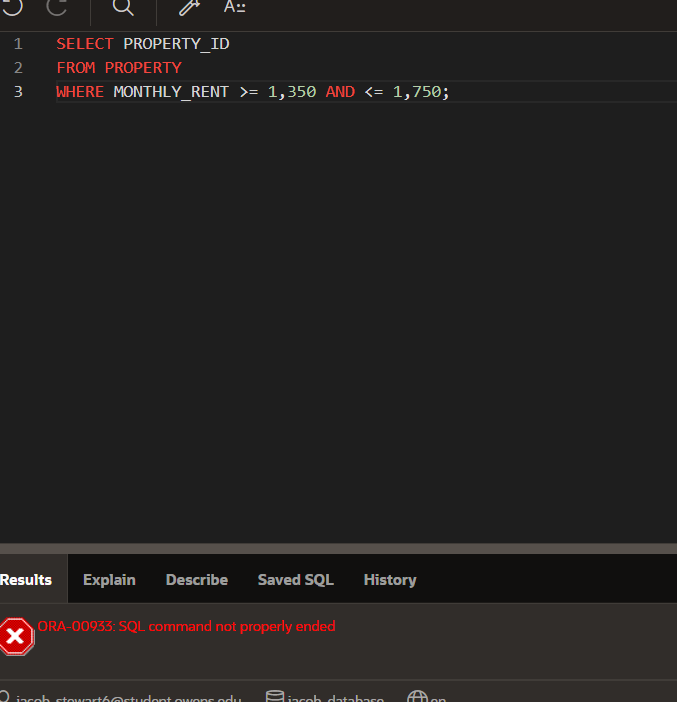
![ORACLE] ORA-00933 SQL command not properly ended 오류 해결 Oracle] Ora-00933 Sql Command Not Properly Ended 오류 해결](https://blog.kakaocdn.net/dn/ckcsMC/btrormr5ctw/wlnKUE0i54Y8awTi6PXaVk/img.png)


![Oracle - Error] ORA-00933: SQL 명령어가 올바르게 종료되지 않았습니다. - Oracle - Error] Ora-00933: Sql 명령어가 올바르게 종료되지 않았습니다. -](https://blog.kakaocdn.net/dn/DYVYM/btqOhuMTVDg/jLB14ZpAgRKQ11VfJhXa11/img.png)
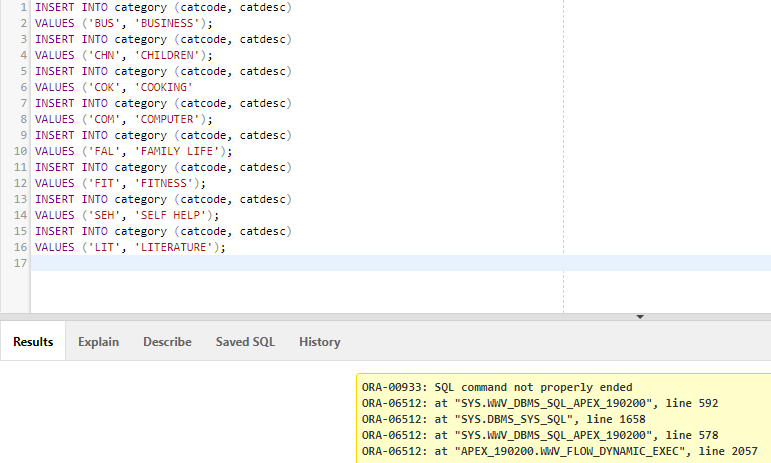

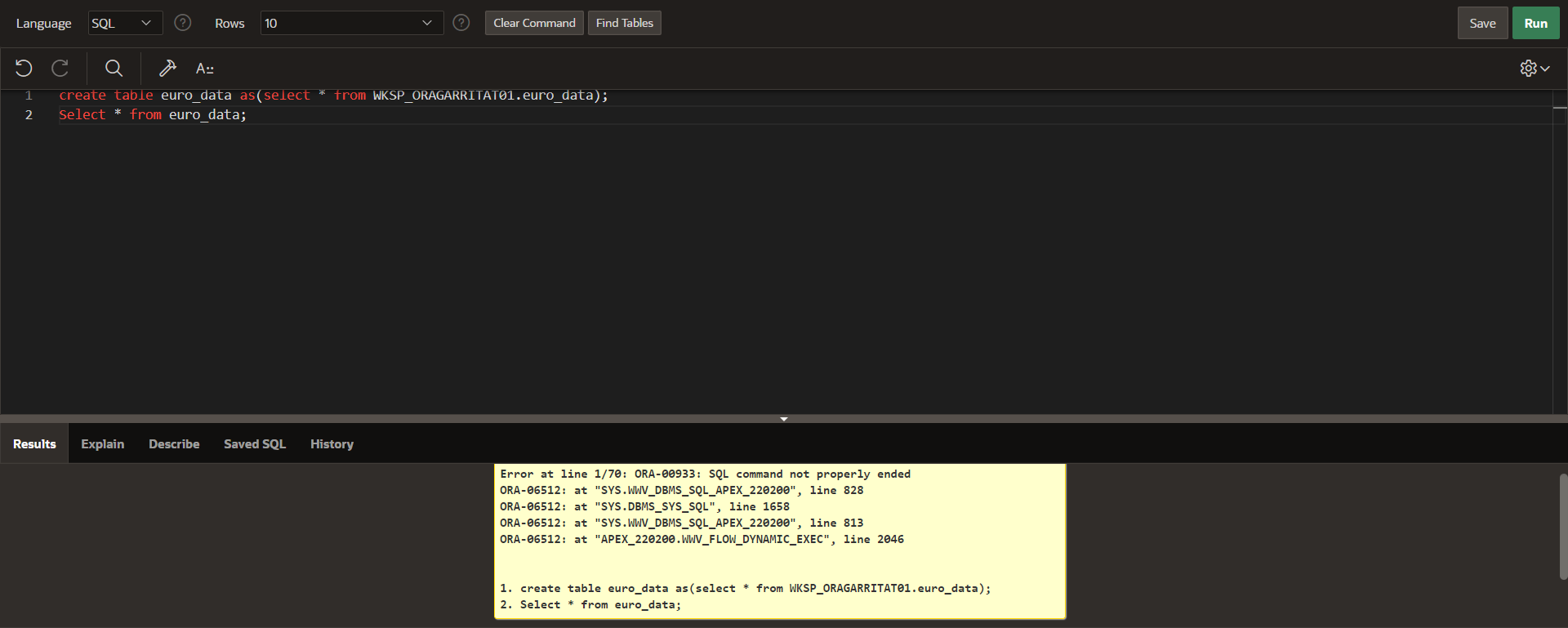

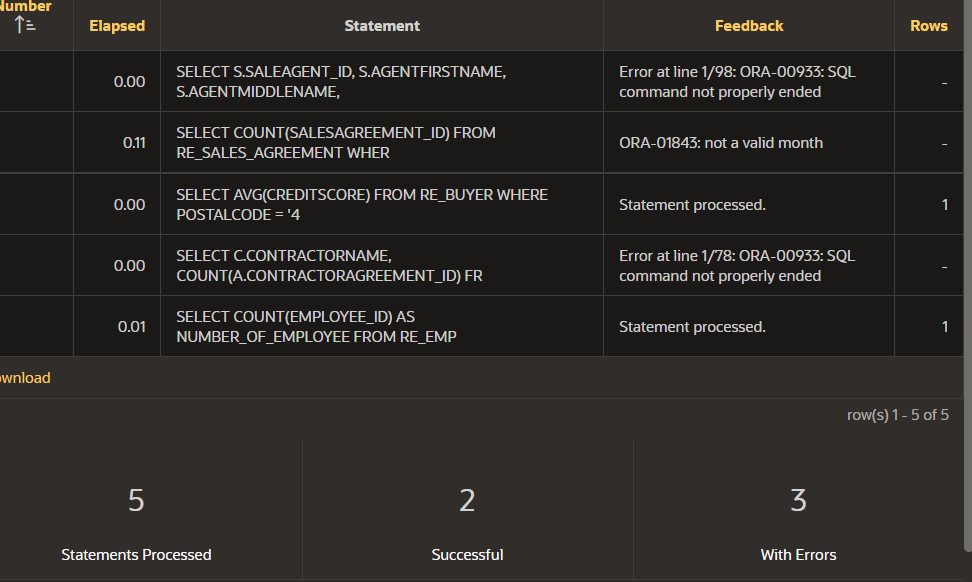


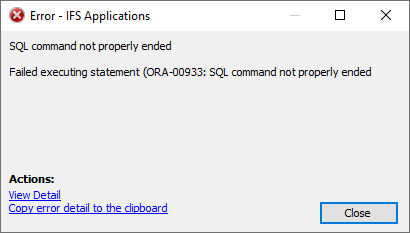






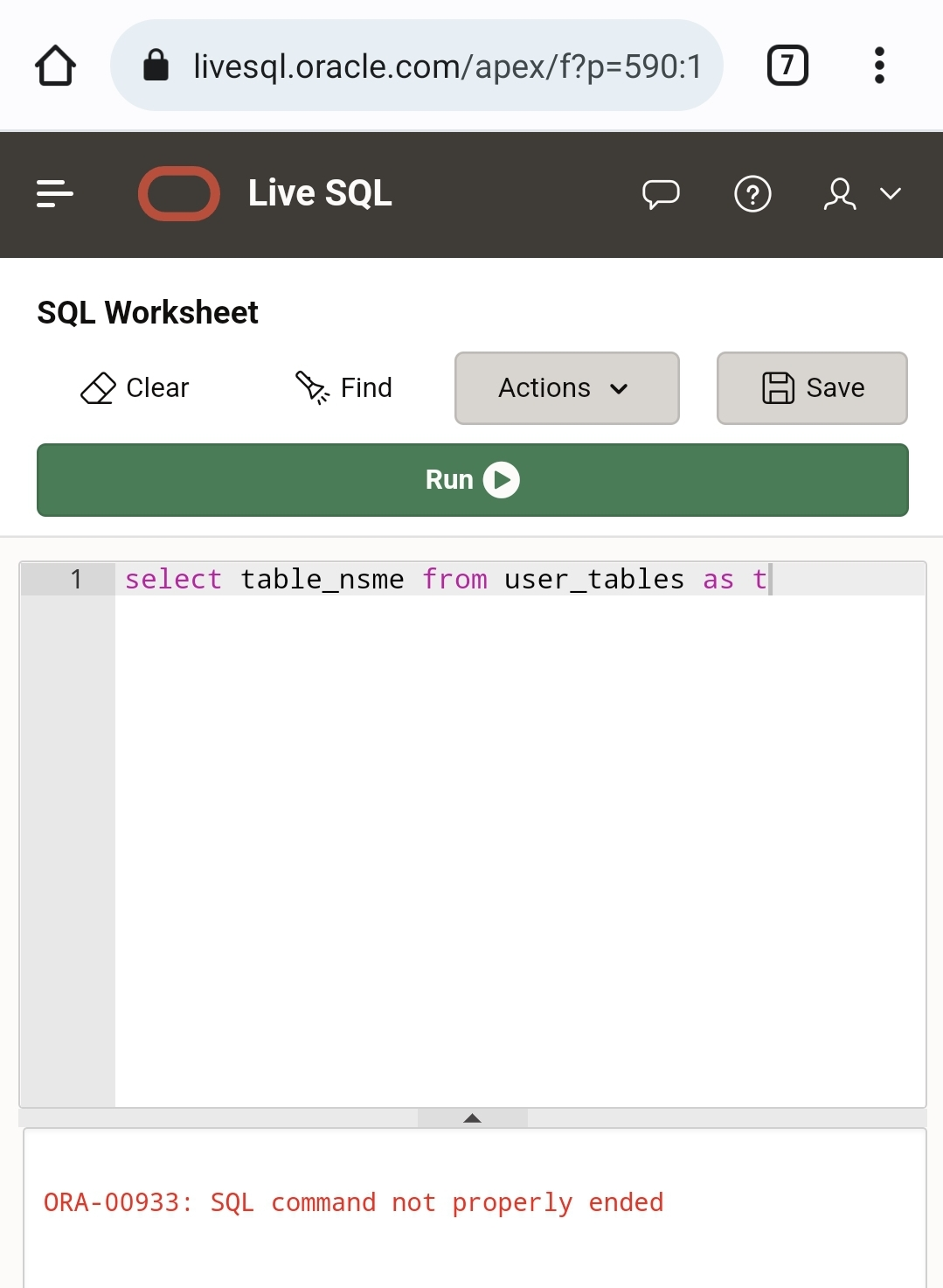




![ORACLE] ORA-00933: SQL command not properly ended Oracle] Ora-00933: Sql Command Not Properly Ended](https://img1.daumcdn.net/thumb/C176x176/?fname=https://t1.daumcdn.net/cfile/tistory/9961423359C4686130)



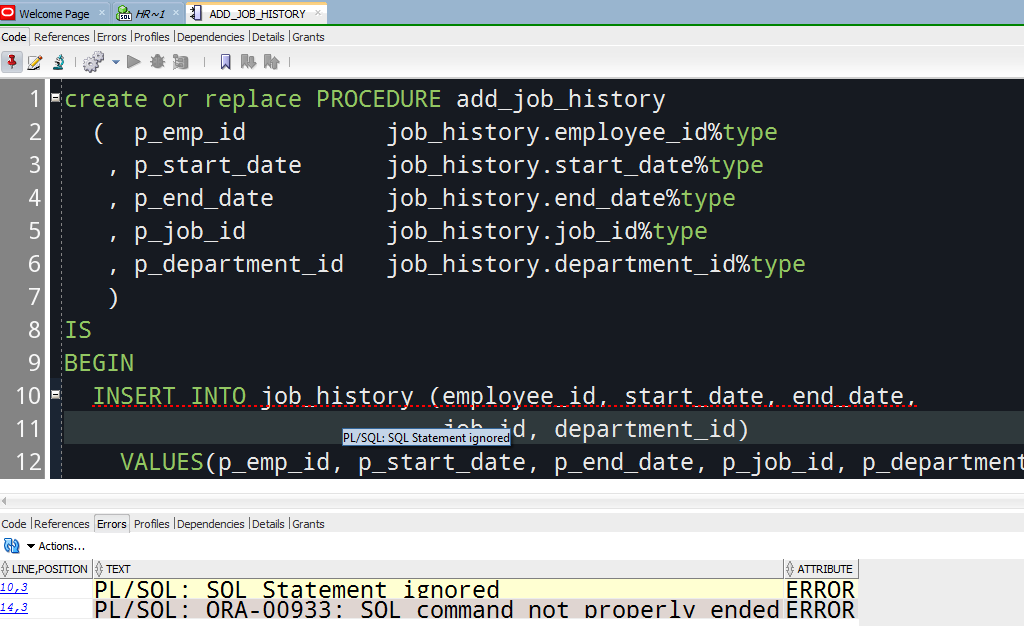



Article link: ora 00933 sql command not properly ended.
Learn more about the topic ora 00933 sql command not properly ended.
- “ORA-00933: sql command not properly ended” error while …
- ORA-00933: SQL command not properly ended
- SQL Error: ORA-00933: SQL command not properly ended
- ORA-00933:SQL command not properly ended
- ORA-00933: sql command not properly ended – Database Star
- ORA-00923: FROM keyword not found where expected
- Terminating Sessions and Cleaning Up Processes – Oracle
- Oracle INSERT ALL statement – Javatpoint
- ORA-00936: missing expression – TekStream Solutions
- How to solve Oracle exception ORA-00933: SQL command …
- ORA-00933: SQL command not properly ended – Yawin Tutor
- ORA-00933: SQL command not properly ended – Virtual-DBA
- SQL command not properly ended SELECT CASE WHEN
- ORA-00933 SQL command not properly ended – IBM
See more: nhanvietluanvan.com/luat-hoc